How to Get the Best SSD Deal
Tips, tricks, and how to tell a deal from a dud
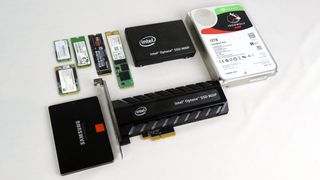
The price of storage just keeps dropping. These days, it's easy to find a 500GB SSD, even one of the best SSDs, for under $60 at regular prices and 1TB drives now frequently slipping under the $100 mark. There are and will likely be plenty of SSD deals this Black Friday deals season, but not all of them will be good ones.
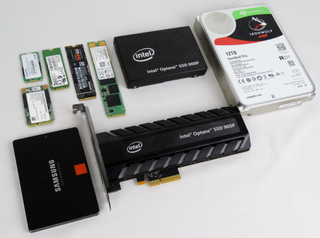
So how do you tell a good SSD deal from a ripoff? ? And what kinds of drives to we expect to see the best deals on during Black Friday and Cyber Monday sales? We’ll delve into both below, but first let’s tackle some helpful SSD-buying basics that will help you stay on a smart drive-buying course.
1. 1TB is the sweet spot, 2TB is even better.
This Black Friday season, we expect to see 1TB drives, in both 2.5-inch SATA and M.2 NVMe types, selling for well under $100 U.S., and sometimes even as low as $80. Faster 1TB NVMe drives like the Adata XPG SX8200 Pro will still be under $130. 2TB drives will still hover around $200 so, if you see one for much less than that, it's a deal. 500GB drives will be less than $70 in most cases, which makes the 1TB size seem like the best bang for the buck.
2. Track price history on potential drive deals.
Given varying capacities, ever-shifting prices, and the hundreds of drive models on the market, it’s tough to make specific statements about what specifically constitutes a deal. But a good practice is to check a price-tracking tool. For products on Amazon, the best price history tool is Camelcamelcamel. Just install the Camelizer Chrome extension and click it when you're on the product page of the SSD you're considering. It will tell you if a product's current price is an all-time low, or perhaps higher than it was a few weeks ago.
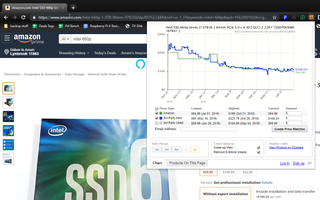
For products that are not on Amazon, use PCPartPicker (see below) which charts the selling price for products over time. On either tool, if you see a price there that’s well below what a drive has sold for in the past, you’ll know you’re getting a good deal.
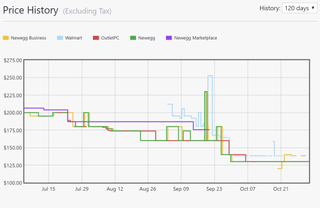
3. Your data is important, so don’t gamble on a no-name brand to save a few bucks.
You can find lots SSDs in the 500GB capacity range for around $50 or even less, but some are from brands you’ve probably never heard of, like Dogfish, KingDian, Vaseky and, our favorite name, Dierya. But pay a few dollars more and you’ll see options from SSD mainstays like Toshiba, WD, and Crucial. A bargain-basement option could be fine, but many of these low-cost drives also have very poor buyer ratings on sites like Newegg and Amazon.
Also, in the event that something does happen to your drive while it’s under warranty, a company with a long track record and a large US presence is probably going to be easier to deal with. That said, any drive can fail unexpectedly. So don’t forget to backup your important data, whether that be in the cloud or on a local hard drive or drives.
4. Any SSD is better than a hard drive.
Even the worst SSD is at least three times as fast as a hard drive. Depending on the workload, the performance delta between good and mediocre SSDs can be subtle. That doesn’t mean you should buy the least-pricey drive you can find. But you probably don’t need to splurge for the best either--unless you have a specific need for a very speedy drive.

5. Know your computer before buying. 2.5-inch SSDs are still the most common.
Find out if you have slots for M.2 drives in your computer. And if you do, check find out if those slots support SATA drives, NVMe drives, or both. For more on drive form factors and interfaces, see our SSD Buying Guide.
With those general concerns out of the way, what do we expect to see as far as SSD sales this Black Friday tech deals season? Let’s tackle most-common SATA drives first.
SATA SSDs
Why you can trust Tom's Hardware
First off, the most interesting deals will probably be in higher-capacity drives that are 1 to 2TB. You can already find lower-quality drives -- those without DRAM cache -- for under $100. But if you see a high-quality drive like Samsung’s SSD 860 EVO or WD Blue drop below $100, it’s certainly worth considering.
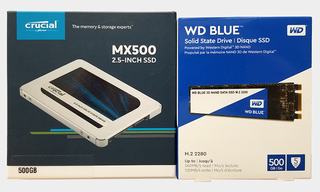
For our money, though, the 2TB drives are the most interesting. Not so long ago, these massive drives were out of reach in the several-hundred-dollar range. But now you can find them hovering a little above or below the $200 mark.
If you’re in the in the market for a roomy drive, we wouldn’t be surprised to see quality drives from companies like Samsung and Crucial dip below $200 on sale. If you see one for under that price point, pull the trigger.
Just keep in mind that these are far from the fastest drives available. If you have a desktop or a laptop with a spare drive bay, you may want to use them as bulk storage for files and games, much like we’ve done with hard drives for decades, while opting for a smaller, faster SSD as your boot drive.
NVMe SSDs
Speaking of faster drives, what should you be on the lookout for when it comes to speedy NVMe drives, which usually come in M.2 or PCIe add-in-card form factors? First off, we wouldn’t expect massive sales on Intel’s flagship Optane drives like the 905p. These drives are incredibly fast and expensive, and the phase-change 3D XPoint tech behind them is still very cutting edge. Those who need or seriously crave that level of speed and endurance seem quite willing to spend the high prices. Intel has little incentive to slash prices there.
But keep an eye on other drives like Intel's 660p, a fairly speedy NVMe drive that's frequently been on sale at SATA-like prices for the past year. We would not be surprised to see that drive below $80 for the 1TB model, or below $175 for the 2TB model.
If you need more advice about what SSD is right for you, you can check our SSD Buying Guide and our Best SSDs page to narrow down your choices. And if you don’t see an SSD deal this month that entices you to click the buy button, don’t worry. SSD prices don't seem likely to rise soon. Mass production of 96-layer manufacturing and the shift to less-expensive quad-level cell (QLC) technology should only make new drives more affordable.
These advancements should combine to deliver higher-capacity SSDs at lower manufacturing costs. But that doesn’t mean you shouldn’t pick up a new drive this year if you find a sweet deal.
Stay On the Cutting Edge: Get the Tom's Hardware Newsletter
Join the experts who read Tom's Hardware for the inside track on enthusiast PC tech news — and have for over 25 years. We'll send breaking news and in-depth reviews of CPUs, GPUs, AI, maker hardware and more straight to your inbox.
After a rough start with the Mattel Aquarius as a child, Matt built his first PC in the late 1990s and ventured into mild PC modding in the early 2000s. He’s spent the last 15 years covering emerging technology for Smithsonian, Popular Science, and Consumer Reports, while testing components and PCs for Computer Shopper, PCMag and Digital Trends.
-
gio966 Based on European price comparator Geizhals.eu STRONGLY DISAGREE with your "keep an eye" Intel 760p e WD black are off the market by Samsung 970 evo market leader european price is 250GB 69EUR (78USD) and 500GB 120EUR(135USD), amazon.com prices are very high 250GB 88USD 500GB 148USD,Reply
Intel 760p cost same but SM2242 performe worse expecially in 240/256GB size
Western Digital WDS500G2X0C in Europe cost 145EUR(164USD) on amazon.com 138.46USD
Today my choiches in Europe are :
Samsung EVO 250GB
Adata S11/SX8200 480GB
Samsung EVO 1TB
Price is a key factor for choose right and prices are valid on 2th November 2018
Sorry for my bad English -
spfleck57 Don't throw away ANYTHING you receive with a new Crucial SSD. The warranty requires you to return the SSD in its original box with original paperwork and ALL parts.Reply -
USAFRet 3. Don’t bother with low-capacity drives.Reply
QFT.
Don't bother with the 120GB drives. The only ones you'll find are off-brand substandard performers.
And you'll be back here in a couple of months, wondering how to manage that rapidly decreasing space. -
araczynski I wouldn't put the Micron 1100 SSD in the same category as other 'good' brands. Market is flooded with them from unofficial resellers and Micron will not honor the warranty.Reply
Micron is either trying to dump/clear these in mass quietly, or they're just inferior chips. -
gio966 Reply21455289 said:3. Don’t bother with low-capacity drives.
QFT.
Don't bother with the 120GB drives. The only ones you'll find are off-brand substandard performers.
And you'll be back here in a couple of months, wondering how to manage that rapidly decreasing space.
I disagree... I am a happy user of a microsoft surface i5-6300 with a NVMe 128GB Samsung PM961 and after a couple of years of intensive use outside of home / office / shop I do not need extra space

